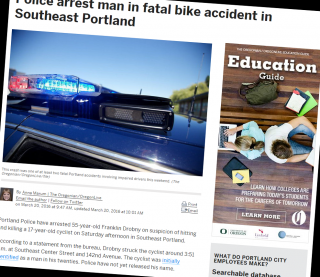I spent five years in daily newspapers. I get it. Everyone has an axe to grind; it is not your job to grind their axes for them.
When you use the word “accident” in a story about a man who allegedly decided to get drunk and zoom down an East Portland side street in a pickup truck, presumably getting a nice bounce over the speed bumps right before he killed a 17-year old on a bicycle, some people get upset.
Use “crash” or “collision,” they plead. Not “accident.”
I got these comments myself sometimes after I’d worked weekend shifts at my last newspaper, The Columbian, and for years I ignored them.
A weekend evening on most of the nation’s daily newspapers is a bloody routine. More Saturday nights than not, you will end up reporting (remotely, without ever visiting the scenes) brief items about one or more of the approximately 577 people who die every week in traffic collisions across the country.
Sometimes you type “collision.” Sometimes you type “accident.” I never had an editor that cared. No wonder; the AP Stylebook implies they’re equivalent.
Of course nobody gets behind a wheel intending to die or kill, I reasoned. Of course these are accidents. By using language acknowledging the plain fact that the deaths were not deliberate, I am avoiding a jump to conclusions. I am being the grownup here.
Advertisement
Then, finally, I landed on an Active Right of Way email thread with a bunch of people who later became my friends. We were discussing a collision in which a man named Antonio Cellestine had been texting while driving and killed a high school teacher.
One person in the conversation, a safety advocate and professional linguist named Alexis Grant, wrote the explanation that set me straight.
The definition of “accident” is “occurs unintentionally”. The final act may be unintentional, but it can still be a serious crime (manslaughter in this case), and one whose genesis was definitely in choices made by the perpetrator. Cellestine was driving on a suspended license and was texting while driving. Intentionally. Those were his choices, even knowing that he was legally forbidden from driving and that texting while driving is not permitted. He decided to break two laws intended to keep the roads safer. He created circumstances in which his likelihood of hurting or killing others or himself was heightened, circumstances he could have chosen not to create. Calling the result an accident minimizes the agency he had in creating it.
Some traffic collisions are actually accidents. Once in a while, someone dies without anyone having made any decision that significantly contributed to the death.
But here’s the thing: A reporter working on a breaking news story about a traffic fatality has no way of knowing whether a particular crash is an accident or not. It’s the same as using “homicide” instead of “murder” or “fight” instead of “attack.” You weren’t there. You just don’t know.
For journalists, the point of avoiding “accident” is not to advance social justice on the streets. The point is to avoid making an inaccurate assumption.
For journalists, the point of avoiding “accident” is not to advance social justice on the streets. That’s an axe for other people to grind.
The point of avoiding “accident” is to do one’s job: to avoid making an inaccurate assumption.
When you are listening to a police scanner in a cubicle late at night, or standing in the rain beside a yellow police ribbon, or interviewing a police sergeant the next day, you simply do not have enough facts to know what choices might have contributed to the collision. You do not know if the collision was purely an accident, and you should not presume that it was.
“Crash” is more accurate. It’s shorter, too. Just write “crash.”
— Michael Andersen, (503) 333-7824 – michael@bikeportland.org
BikePortland can’t survive without subscribers. It’s just $10 per month and you can sign up in a few minutes.


